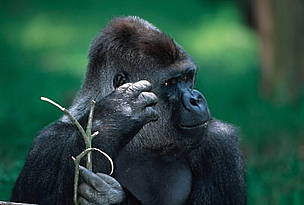More than 3 million hectares of elephant, gorilla habitat get new protection
More than 3 million hectares of newly designated Ramsar sites in the Republic of Congo will provide vital habitat to endangered species and support the livelihoods of surrounding communities. Congo now counts 10 Wetlands of International Importance, totalling 11.7 million hectares.

Western Lowland Gorilla, Silverback male.
Anada Tiega, Secretary General of the International Convention on Wetlands, congratulated the Republic of Congo for this major conservation milestone achieved with WWF’s support. Tiega said these new designations come at an opportune time, as nations meet in Hyderabad, India, to shore up commitments to protecting biological diversity.

Forest elephants (Loxodonta cyclotis) drinking water in the Dzanga Bai forest clearing.
“During the last meeting of the Convention on Biological Diversity, the 193 member nations set a target to protect at least 17 per cent of their terrestrial and inland water ecosystems by 2020. This move by the Republic of Congo demonstrates how protecting wetlands through Ramsar can help countries meet their commitments,” said Tiega.
The new sites harbour a wealth of plant and animal species, including several IUCN Red-Listed species such as hippopotamus (Hippopotamus amphibius), African elephant (Loxodonta africana), western lowland gorilla (Gorilla gorilla gorilla) and chimpanzee (Pan troglodytes troglodytes).
They are also home to hundreds of fish species, which are both a source of nutrition and income for surrounding communities. The marshes, ponds, lakes and flooded forests are part of the migration path of more than 200 species of bird. The sites are:
•Odzala Kokoua: 1,300,000ha, West Basin Division
•Ntokou Pikounda: 427,200ha, Sangha Basin Division
•Vallée du Niari: 1,581,000ha, South of the Republic of Congo
Protecting habitat for charismatic species could enhance tourism opportunities in the Republic of Congo, with potential economic, environmental and social benefits. Sustainable tourism practiced in and around wetlands can contribute to poverty alleviation through the improvement of livelihoods, regional and national economies and support to local cultures.
Source: World Wildlife Fund
- 298 reads
Human Rights
Ringing FOWPAL’s Peace Bell for the World:Nobel Peace Prize Laureates’ Visions and Actions

Protecting the World’s Cultural Diversity for a Sustainable Future

The Peace Bell Resonates at the 27th Eurasian Economic Summit

Declaration of World Day of the Power of Hope Endorsed by People in 158 Nations

Puppet Show I International Friendship Day 2020

